- Home
- Ann M. Martin
Kristy and the Missing Fortune Page 4
Kristy and the Missing Fortune Read online
Page 4
“It’s such a shame,” said the curator, shaking her head. “Underneath the mess, those gardens are a real historical treasure. There are plants in there that you can’t find anywhere else these days, even though they originated in this area. The gardens were started over a hundred years ago.” She sighed. “And now the arboretum is on the brink of closing.”
“What?” asked Jessi. “Why?”
“Well,” said Mrs. Goldsmith, “the house and the greenhouse belong to Stoneybrook, but that land out there probably doesn’t. We aren’t sure who it belongs to, since the original lease for it is missing and the town records were destroyed in a fire years and years ago. Now the land has caught the eye of a developer who wants to build subdivisions here. He brought the question of the lease to the state’s attention, and now the state is planning to auction the land off.” She paused. “If the land is sold, the arboretum will have to close. We can barely afford to keep it open as it is, and without the fees we charge for summer garden tours we’d be lost. Anyway, if he buys the land, the developer will have the right to kick us out and knock down the house.”
“That’s awful!” said Jessi. She was horrified.
“Isn’t there anything you can do about it?” asked Charlotte.
“Well, we do have one hope,” said Mrs. Goldsmith, though she didn’t sound too hopeful. “There’s a wealthy donor, Mrs. VanderBellen, who’s expressed some interest in buying the land and maintaining the arboretum. She’s supposed to be coming by one day soon to look the place over.” The curator glanced out the window, and Jessi followed her gaze. Then Mrs. Goldsmith shook her head. “But I’m afraid I’ll never be able to whip this place into decent shape in time,” she said. “Not without my summer help. They’re all college students, so I won’t have them until June.”
That was when Jessi had her great idea. She started talking without having thought it out, but Mrs. Goldsmith just listened and nodded. And before long, they’d worked out all the details:
Jessi, and whatever kids and BSC members she could round up, would volunteer after-school time to help clean up the arboretum grounds. In return, Mrs. Goldsmith would help Jessi figure out what to do with Mrs. Dodson’s ailing plants. (Actually, Mrs. Goldsmith told Jessi she would have been glad to do that in any case. But Jessi insisted that this arrangement was a fair exchange.)
Soon after, Jessi called her dad and asked him to pick her and the girls up. And all the way home, the three of them chattered happily about how much fun it would be to fix up the arboretum, and maybe — just maybe — save it from the developers. Jessi was sure she’d finally come up with the perfect cure for cabin fever.
“It sounds like fun. But what if we pull up some hundred-year-old specimen by mistake? All those plant things look the same to me.” Stacey looked perplexed.
“Plant things?” asked Claud, cracking up. “Oh, Stacey, you’re such a city girl.” Then she lost her grin. “Come to think of it, I don’t know that much about plants myself,” she added. She dug into the bowl of popcorn she held on her lap and pulled out a handful. Then she passed the bowl to Stacey.
It was Monday, and we were in the midst of our BSC meeting. We had already taken care of all the club business, and now we were discussing Jessi’s idea for helping to save the arboretum. I was interested in the project, but once again I was waiting to bring up my own subject: the mystery of Christina. So, I listened to the conversation going on around me, but at the same time I was thinking about my mystery, and about the best way to present the facts to my friends. I chewed nervously on my pencil while I waited.
“Mrs. Goldsmith said it wouldn’t matter whether we knew anything about gardening or not,” said Jessi, in answer to Stacey and Claud. “She’ll tell us exactly what to do. Anyway, it’s really too cold for weeding and taking care of plants. We’re just trying to make the place look decent. There’s a lot of litter to be picked up and hauled away, and stone walls to be repaired, and raking to do — stuff like that. Mrs. Goldsmith also needs help cataloging the indoor plants and tidying up the greenhouse.”
“I usually hate gardening,” said Mal. “But I’m so sick of winter it actually sounds like fun.”
“I know,” I said, putting down my gnawed-up pencil and forgetting about Christina for a minute. “Maybe I’ll take Karen and David Michael there on Thursday. They’d have a great time.”
“I won’t be able to get there for a few days,” said Mary Anne. “But I’m sitting for the Arnold twins on Friday so I’ll definitely bring them over. They love projects like this.” Then Mary Anne turned to me with an odd look on her face. “Kristy, why are you jiggling your leg like that? Are you nervous about something?”
“Me, jiggling?” I asked, surprised. Trust Mary Anne to notice.
“Yes,” she said. “And just look at your pencil.”
Mary Anne sounded so much like my third-grade teacher that I had to giggle. I held up the pencil and looked at it. “Delicious,” I said.
“So, what’s up?” asked Mary Anne.
“Oh, nothing much,” I said, trying to act casual. “Just that I might be a millionaire if I can solve this mystery.” I raised my eyebrows and pretended to yawn.
“A millionaire?” asked Mary Anne. Her mouth had fallen open.
“What are you talking about?” asked Dawn.
“Spill the beans!” said Jessi.
“Well, you remember Christina Thomas, right?” I asked. “The girl who disappeared? The one we thought might possibly be related to me?”
Everybody nodded. “Go on,” said Stacey.
“Well, I found out yesterday that at the time she disappeared, Christina was very rich,” I said, drawing it out. Why not add a little suspense?
“And?” asked Claudia, giving me a threatening look.
“And her fortune disappeared with her,” I said. “As far as I could tell, it’s never been found.”
“Whoa!” breathed Claudia.
“A missing fortune,” mused Mal. “What a great story!”
It sounded as if Mal were already plotting a children’s book about this mystery. The only problem was that we hadn’t solved it yet.
“You could be rich,” said Stacey dreamily. “I mean, I know Watson’s rich, but this would be your own money. Just think, you could be wearing original Gaultier clothes and jewelry from Tiffany’s.”
“Uh, right,” I said. I had no idea who Goatee-ay was, but I had the feeling I wouldn’t wear his clothes if I had three million dollars to spend. And as for jewels from Tiffany’s, I’d rather have a new first-baseman’s mitt by Rawlings. “There’s only one problem,” I added. “Or rather, make that two.” I held up two fingers and counted off the reasons. “One: I don’t know where Christina disappeared to. And two: I don’t know how or where to find her fortune.” I held up one more finger. “Not to mention a third problem: I don’t have any way of knowing if she really is related to me, anyway.”
“Hmmm,” said Claudia. She dug into the popcorn bowl again, absently. She was staring off into space, her brow wrinkled.
I could almost see Claud’s brain working. She has read every single Nancy Drew book in existence (some of them twice), and she remembers every single mystery and how it was solved. (Don’t ask me why she can’t remember enough to pass a weekly math quiz.)
“Sounds like you need to do a little more digging,” Claudia finally said.
“But where?” I asked.
“Back at the library,” said Claud, holding up a finger. “I’ll help. We’ll have to look through some of the old town records they keep there.”
“I’ll help, too,” said Mary Anne. “Let’s go tomorrow, after school. We can go through all the old newspapers on file, too.”
I groaned.
“It won’t be so bad, with three of us working,” Claudia reassured me. “Besides, isn’t it worth it? You might be earning yourself a fortune!”
“Right,” I said. “And I suppose you’ll want a share of it, too.”
“You know it,” she said, laughing. “Shall we say, oh, fifty-fifty?”
“What about me?” asked Mary Anne. “I’m helping, too.”
“Oh, right,” said Claud. “So we’ll each make — let’s see, how much is three into a million dollars?” She pretended to punch some numbers into a calculator. We all cracked up.
* * *
As soon as school was over the next day, I headed for the library with Mary Anne and Claudia. We were each carrying notebooks and pens, and I had a file I’d made which contained the information I had found so far.
Mrs. Kishi greeted us when we trooped in. “Nice to see you, girls,” she said. “I have you set up in the reference room. If you can use any help on your school project, just let me know.”
School project? Automatically, I thanked Mrs. Kishi. But as soon as her back was turned, I raised my eyebrows at Claudia.
She shrugged. “I didn’t think she’d be crazy about me wasting my time pretending to be Nancy Drew,” she explained. “So I fibbed just a little.”
“Claudia!” said Mary Anne.
“Claudia!” I echoed.
“What?” Claudia asked innocently. “Let’s start working. What are we waiting for?” She led us to the reference room, where Mrs. Kishi had left out stacks of microfilm and piles of old books. “Yikes,” said Claudia, when she saw how much material we had to go through. “You know, now that I think about it, there’s this new book on Matisse my mom told me about. Maybe I’ll go look for it.”
“And I wanted to find a craft book. I need some ideas for making cat toys,” said Mary Anne. They both started to edge away.
“Oh, no, you don’t,” I said. “I have other stuff I could do here, too. I promised David Michael I’d look up some stats in the Baseball Encyclopedia. But we have a job to do. Let’s just get it over with!”
After that, we settled down to work, and I have to say we made a pretty terrific team. Claudia flipped through the microfilm index to the Stoneybrook News, and called out the numbers for pages that might give us information we needed. I took down the numbers in my notebook and lined up the rolls of microfilm we’d need to look at. Mary Anne, meanwhile, began to pore over the town records, running a finger down each page and taking notes on any Thomas connections that looked as if they might be important.
Most of the work was boring and repetitive and frustrating. Tracing a family history may seem simple, but it isn’t. For one thing, people move away, and then sometimes turn up again. Also, daughters get married and change their names. Not every Thomas descendent was a Thomas. Far from it. We ended up having to trace the Johnson and Abbott families, too.
We did find out a few interesting things. For example, we read the details of the carriage accident in which Christina’s parents died (it was as gruesome as a modern-day car wreck). Plus, we found out a little bit more about Christina’s disappearance. Apparently, she had left Squirelot, her parents’ estate, on or about January 8th of 1863. A scullery maid insisted that Christina had been headed for Pennsylvania, but no trace of her was ever found in that state or in any town between it and Stoneybrook.
As for tracing the Thomas descendents, we ran into a lot of dead ends. John and Rachel had had three children: Christina, Devon, and Edward. Christina, of course, had disappeared. Devon had a son, Devon II and he had a son, Devon III. Devon III had also had a son (guess what his name is!), but from what we could tell he wasn’t a Stoneybrook resident.
Edward, meanwhile, had three children: Scott, Mary, and Ellen. Mary never had children, and Ellen’s children wouldn’t have been Thomases, so I figured Scott was the ony one who could be my ancestor. I even had a vague memory of my dad telling me about his great-great-aunt Mary, who’d never married. For a few minutes I was pretty excited about finding a link that would tie me to Christina’s fortune. So were Mary Anne and Claudia. The only problem was that we couldn’t find a single descendent of Scott’s listed in the Stoneybrook records or mentioned in the newspaper. See what I mean about dead ends?
After about three hours in the library, we came up with a family tree that looked something like this:
We traced Ellen Thomas’s descendents (who seemed to be the only members of the family to stay in Stoneybrook) down to a woman named Mildred Abbott. Mrs. Abbott would be Christina’s great-great-niece, if our calculations were right. And according to the phone book, she still lived in Stoneybrook. Other than Mildred, though, the trail was cold.
“So what do we do now?” asked Mary Anne, who was staring down at the Thomas family tree. She looked a little discouraged.
“I know what I’m going to do,” I told her. “As soon as I get home, I’m going to call this Mrs. Abbott. It looks like she’s our only hope. If she doesn’t know something about Christina, nobody does. Or at least, nobody we can find.”
* * *
And that’s how I, Kristy Thomas, ended up being invited to Friday afternoon tea at the home of — guess who? — Mrs. Mildred Abbott.
I don’t usually waste time being nervous about things; I just do them. That’s why I hadn’t been tense when I called Mrs. Abbott. I just picked up the phone and called her. When she answered, I told her who I was and why I was interested in talking with her. And she invited me to tea on the spot.
See how easy these things are? There’s no reason to be nervous.
But guess what? The second I hung up, I started to feel nervous. Very, very nervous. Why? Well, because Mrs. Abbott sounded like a proper person. The kind of person who might correct your grammar, or tell you to sit up straight and stop slouching. The kind of person who would probably disapprove if I showed up for tea in my usual “uniform” of jeans, running shoes, and a turtleneck.
I wanted to make a good impression on Mrs. Abbott, because from what I could tell by the research we’d done so far, I was going to have to convince her to answer some questions if I wanted to find out more about the Thomas family history. That’s why I ended up staring into my closet that night, trying to figure out which of my skirts I could stand to wear. (I only have a couple of them, since I wear them so infrequently.) I chose a dark-green corduroy skirt, which I planned to wear with a white button-down shirt, and a blue sweater, panty hose (ugh!), and brown loafers. I knew I’d catch a lot of teasing when I wore that outfit to school on Friday (since nobody ever sees me dressed like that), but I had no choice. I wouldn’t have time to go home and change before tea with Mrs. Abbott.
I made sure the clothes I was planning to wear were clean and pressed, and that the loafers were polished. I checked to see that I had a fresh notebook and a working pen, so I’d be ready to take notes on what Mrs. Abbott told me. And I practiced sitting up straight and saying, “No, thank you, ma’am,” and “Yes, please, ma’am.”
After that, there was nothing I could do but wait.
Tea wasn’t until Friday, so I still had all day Thursday to wait through. School was enough of a distraction, but how would I fill the time after school?
I shouldn’t have worried.
After school on Thursday, I stood in front of my closet, doing one more check on my outfit for Friday. Suddenly, there was a knock on my door, and before I could even call out “come in,” Karen was bouncing on my bed. “When are we going?” she asked.
“Going?” I said, confused.
“To the plant place!” Karen said. “You promised!”
I had totally forgotten I’d promised to take her and David Michael to the arboretum that day. (That just goes to show you how nervous I was about tea with Mrs. Abbott. Normally, I would never forget a promise I’d made to a kid.)
Karen was all psyched up for working at the arboretum. She’d already changed into a pair of overalls and begged Watson to let her borrow his good English trowel. She had David Michael excited about our trip, too.
It’s not as if either of them loves gardening that much. Oh, they’ll putter around in the garden with Watson, as he trims his roses or mulches his shrubs, but only if there’s nothing else to do.
“Nothing else to do” were the key words that day. I knew Karen was only dying to go to the “plant place” because she was so tired of being cooped up in the house.
Well, I felt the same way. I had a little touch of cabin fever myself, not to mention a case of nerves. And a trip to the arboretum seemed the perfect solution.
Watson was happy to drive us there. “I’ve never even heard of this place before,” he said when he pulled up to the big brick building. “Isn’t this something! I wish I could stay and help, but I have a very important date with a certain young lady.” He turned to smile at Emily Michelle, who was strapped into her car seat.
“Barn — ee!” she squealed, waving her hands in the air.
“That’s right,” said Watson. “We’re going to watch Barney together, just as soon as we get home.”
I’m still not used to Watson being home so much, but it’s obvious that he and Emily Michelle are closer than ever since he’s been playing “Mr. Mom.” Karen and David Michael and I piled out of the van and waved as Watson and Emily Michelle drove off. Then we set out to find Jessi.
I heard the sound of raking coming from behind the house, so instead of heading inside, we decided to check there first.
“Hey!” I heard Jessi call as we rounded the corner. “Look who’s here.” She put down her rake and tapped Matt Braddock, who was raking next to her, on the shoulder. Matt hadn’t heard us coming because he’s deaf. He communicates by reading lips and by using American Sign Language. All of the members of the BSC have learned a little ASL — except for Jessi, who’s learned a lot. Plus, quite a few of the kids who know Matt have picked up some signs.

 Karen's Tea Party
Karen's Tea Party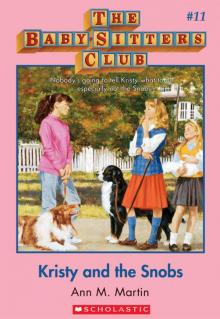 Kristy and the Snobs
Kristy and the Snobs Best Kept Secret
Best Kept Secret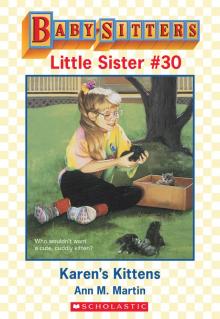 Karen's Kittens
Karen's Kittens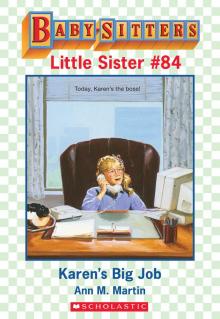 Karen's Big Job
Karen's Big Job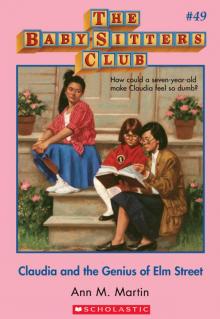 Claudia and the Genius of Elm Street
Claudia and the Genius of Elm Street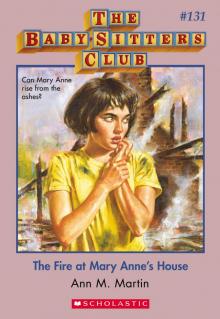 The Fire at Mary Anne's House
The Fire at Mary Anne's House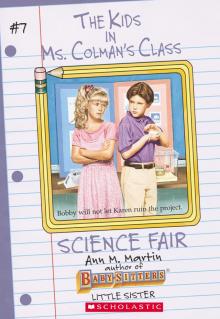 Science Fair
Science Fair Me and Katie (The Pest)
Me and Katie (The Pest)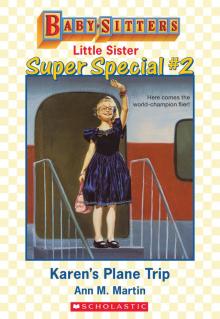 Karen's Plane Trip
Karen's Plane Trip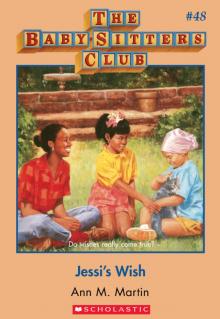 Jessi's Wish
Jessi's Wish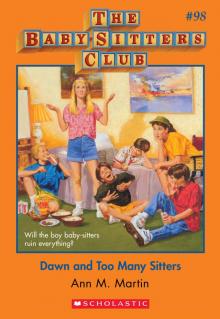 Dawn and Too Many Sitters
Dawn and Too Many Sitters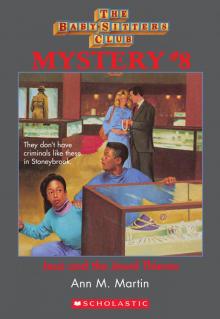 Jessi and the Jewel Thieves
Jessi and the Jewel Thieves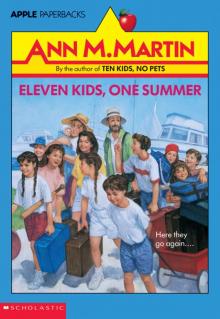 Eleven Kids, One Summer
Eleven Kids, One Summer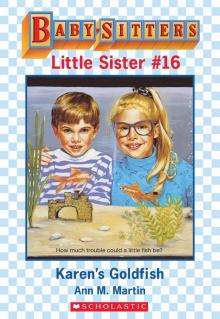 Karen's Goldfish
Karen's Goldfish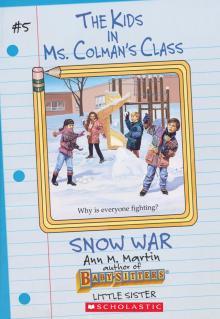 Snow War
Snow War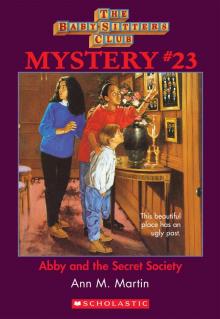 Abby and the Secret Society
Abby and the Secret Society Keeping Secrets
Keeping Secrets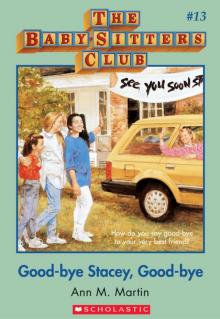 Good-Bye Stacey, Good-Bye
Good-Bye Stacey, Good-Bye Karen's Sleepover
Karen's Sleepover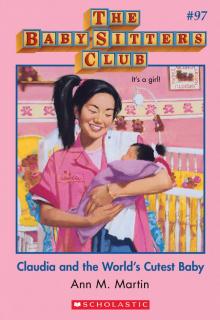 Claudia and the World's Cutest Baby
Claudia and the World's Cutest Baby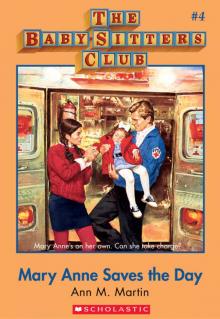 Mary Anne Saves the Day
Mary Anne Saves the Day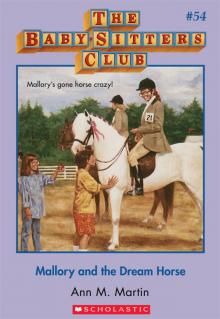 Mallory and the Dream Horse
Mallory and the Dream Horse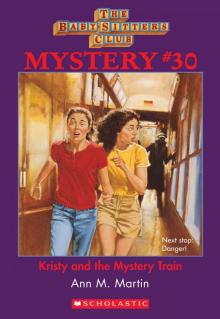 Kristy and the Mystery Train
Kristy and the Mystery Train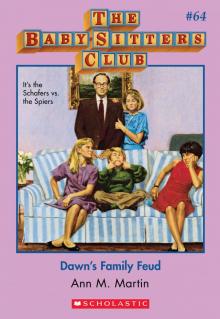 Dawn's Family Feud
Dawn's Family Feud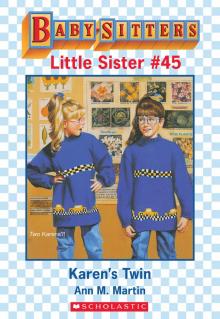 Karen's Twin
Karen's Twin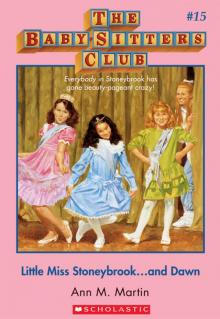 Little Miss Stoneybrook... And Dawn
Little Miss Stoneybrook... And Dawn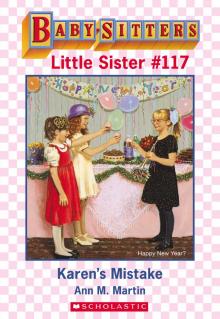 Karen's Mistake
Karen's Mistake Karen's Movie Star
Karen's Movie Star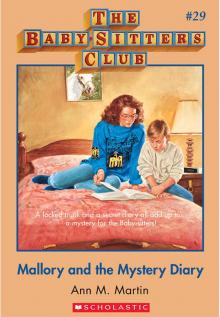 Mallory and the Mystery Diary
Mallory and the Mystery Diary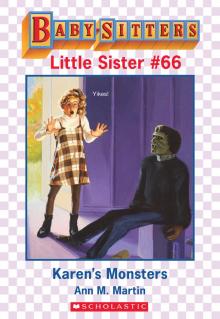 Karen's Monsters
Karen's Monsters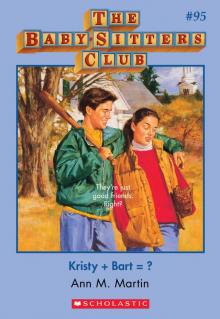 Kristy + Bart = ?
Kristy + Bart = ?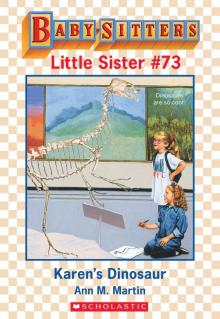 Karen's Dinosaur
Karen's Dinosaur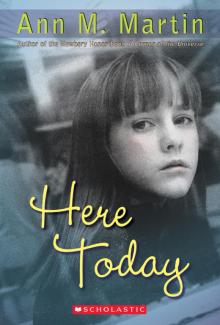 Here Today
Here Today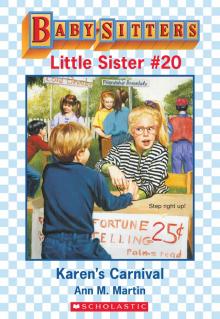 Karen's Carnival
Karen's Carnival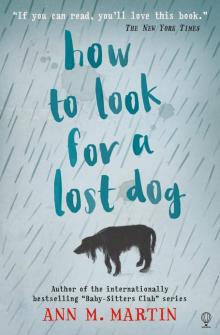 How to Look for a Lost Dog
How to Look for a Lost Dog Stacey vs. Claudia
Stacey vs. Claudia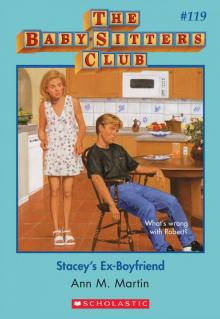 Stacey's Ex-Boyfriend
Stacey's Ex-Boyfriend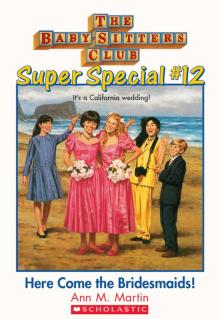 Here Come the Bridesmaids!
Here Come the Bridesmaids! Graduation Day
Graduation Day Kristy's Big News
Kristy's Big News Karen's School Surprise
Karen's School Surprise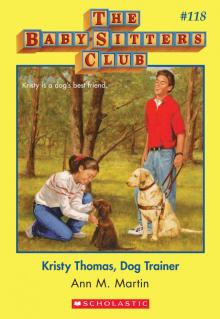 Kristy Thomas, Dog Trainer
Kristy Thomas, Dog Trainer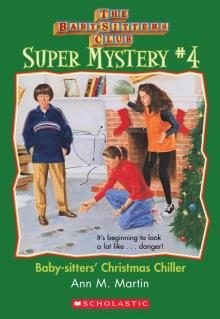 Baby-Sitters' Christmas Chiller
Baby-Sitters' Christmas Chiller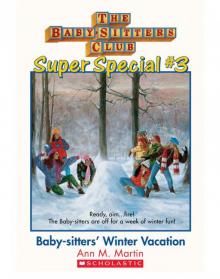 Baby-Sitters' Winter Vacation
Baby-Sitters' Winter Vacation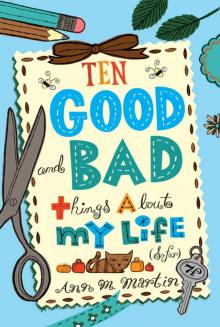 Ten Good and Bad Things About My Life
Ten Good and Bad Things About My Life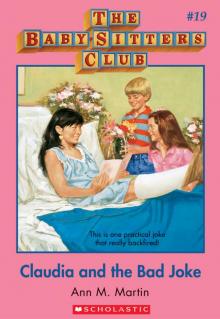 Claudia and the Bad Joke
Claudia and the Bad Joke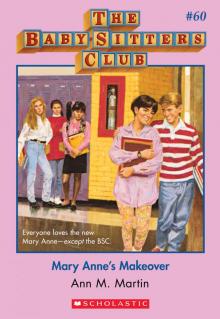 Mary Anne's Makeover
Mary Anne's Makeover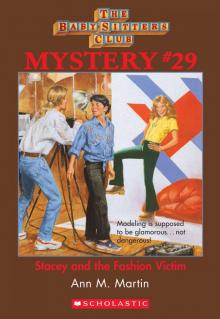 Stacey and the Fashion Victim
Stacey and the Fashion Victim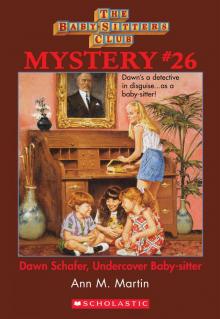 Dawn Schafer, Undercover Baby-Sitter
Dawn Schafer, Undercover Baby-Sitter Karen's Tuba
Karen's Tuba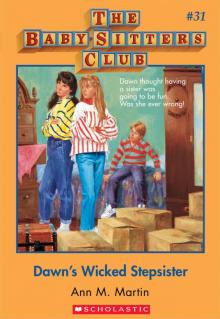 Dawn's Wicked Stepsister
Dawn's Wicked Stepsister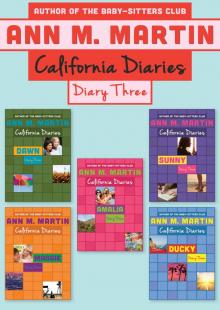 Diary Three: Dawn, Sunny, Maggie, Amalia, and Ducky
Diary Three: Dawn, Sunny, Maggie, Amalia, and Ducky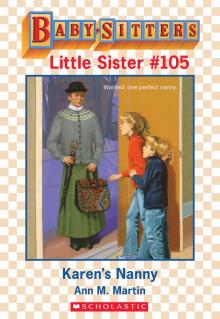 Karen's Nanny
Karen's Nanny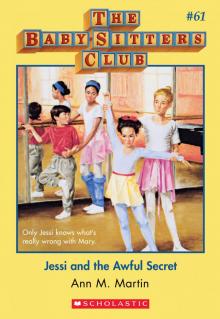 Jessi and the Awful Secret
Jessi and the Awful Secret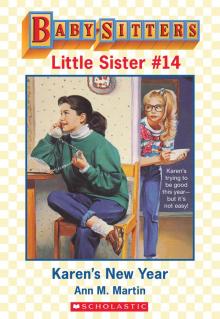 Karen's New Year
Karen's New Year Karen's Candy
Karen's Candy Karen's President
Karen's President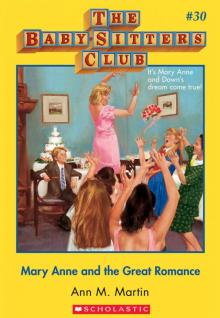 Mary Anne and the Great Romance
Mary Anne and the Great Romance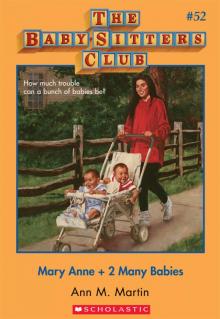 Mary Anne + 2 Many Babies
Mary Anne + 2 Many Babies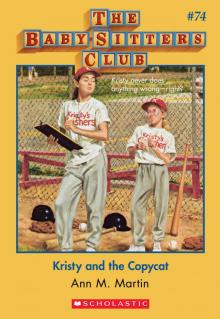 Kristy and the Copycat
Kristy and the Copycat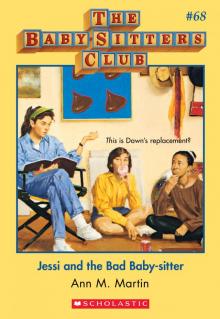 Jessi and the Bad Baby-Sitter
Jessi and the Bad Baby-Sitter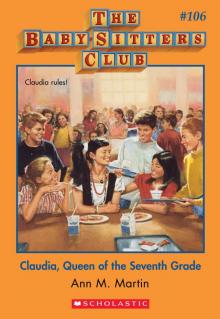 Claudia, Queen of the Seventh Grade
Claudia, Queen of the Seventh Grade Claudia and the Lighthouse Ghost
Claudia and the Lighthouse Ghost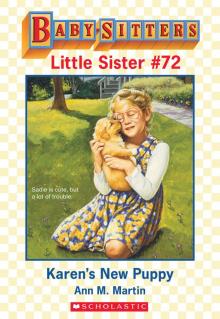 Karen's New Puppy
Karen's New Puppy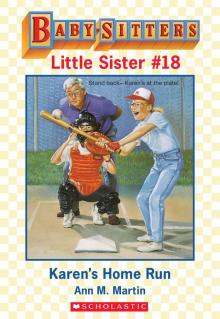 Karen's Home Run
Karen's Home Run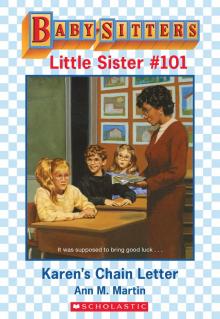 Karen's Chain Letter
Karen's Chain Letter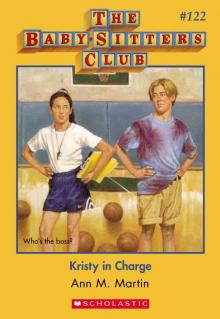 Kristy in Charge
Kristy in Charge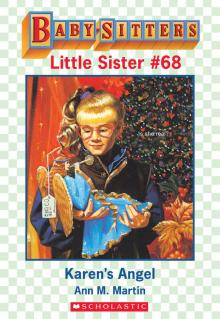 Karen's Angel
Karen's Angel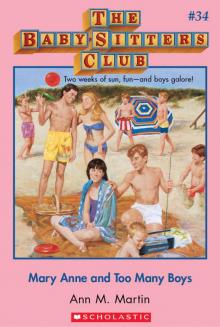 Mary Anne and Too Many Boys
Mary Anne and Too Many Boys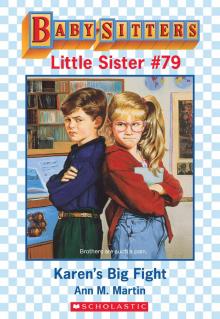 Karen's Big Fight
Karen's Big Fight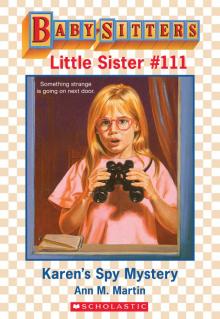 Karen's Spy Mystery
Karen's Spy Mystery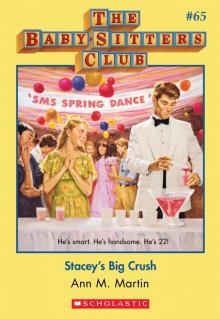 Stacey's Big Crush
Stacey's Big Crush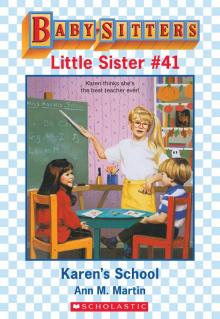 Karen's School
Karen's School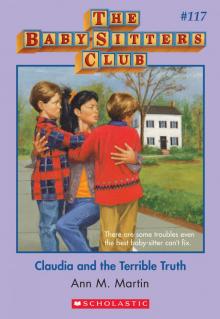 Claudia and the Terrible Truth
Claudia and the Terrible Truth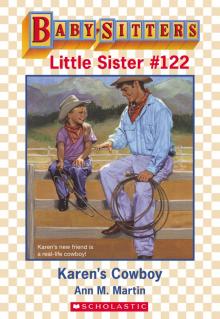 Karen's Cowboy
Karen's Cowboy The Summer Before
The Summer Before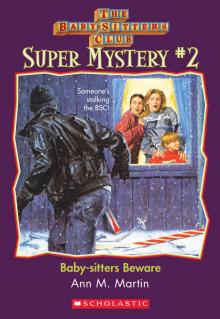 Beware, Dawn!
Beware, Dawn!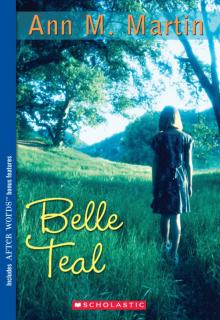 Belle Teale
Belle Teale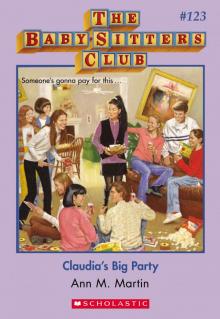 Claudia's Big Party
Claudia's Big Party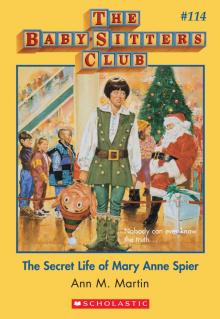 The Secret Life of Mary Anne Spier
The Secret Life of Mary Anne Spier Karen's Book
Karen's Book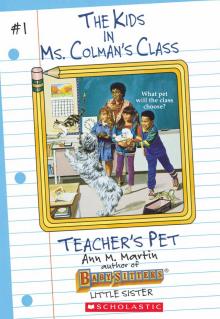 Teacher's Pet
Teacher's Pet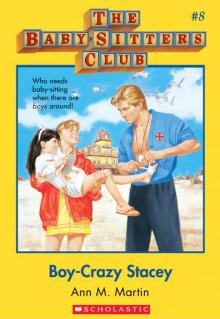 Boy-Crazy Stacey
Boy-Crazy Stacey Claudia and the Disaster Date
Claudia and the Disaster Date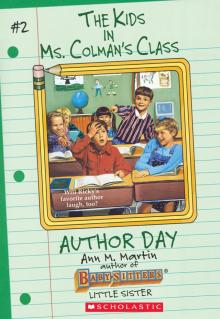 Author Day
Author Day Claudia and the Sad Good-Bye
Claudia and the Sad Good-Bye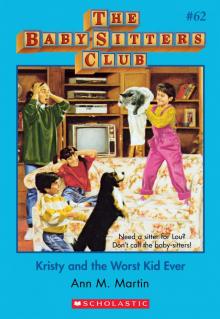 Kristy and the Worst Kid Ever
Kristy and the Worst Kid Ever Yours Turly, Shirley
Yours Turly, Shirley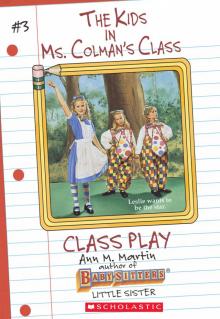 Class Play
Class Play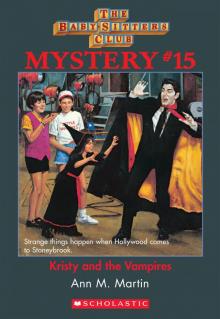 Kristy and the Vampires
Kristy and the Vampires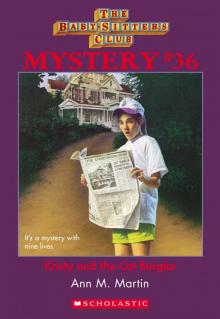 Kristy and the Cat Burglar
Kristy and the Cat Burglar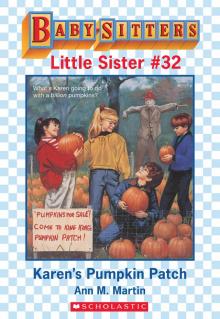 Karen's Pumpkin Patch
Karen's Pumpkin Patch Stacey and the Mystery at the Empty House
Stacey and the Mystery at the Empty House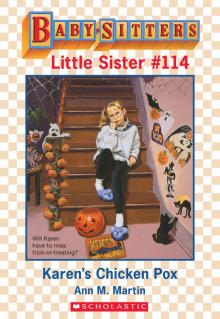 Karen's Chicken Pox
Karen's Chicken Pox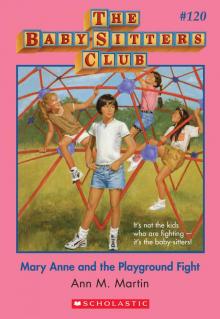 Mary Anne and the Playground Fight
Mary Anne and the Playground Fight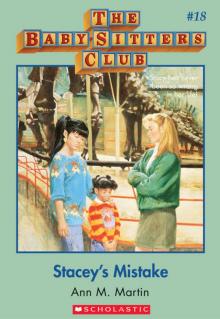 Stacey's Mistake
Stacey's Mistake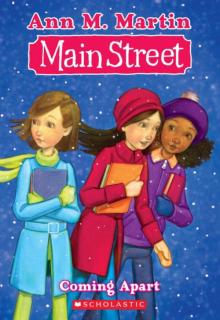 Coming Apart
Coming Apart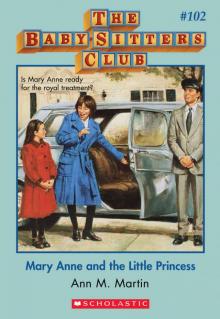 Mary Anne and the Little Princess
Mary Anne and the Little Princess Karen, Hannie and Nancy: The Three Musketeers
Karen, Hannie and Nancy: The Three Musketeers 'Tis the Season
'Tis the Season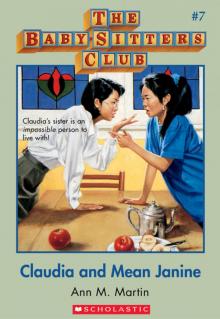 Claudia and Mean Janine
Claudia and Mean Janine Karen's School Bus
Karen's School Bus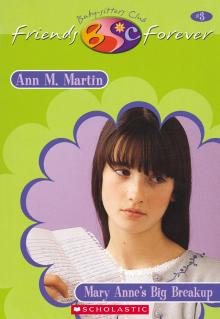 Mary Anne's Big Breakup
Mary Anne's Big Breakup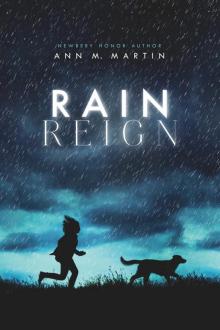 Rain Reign
Rain Reign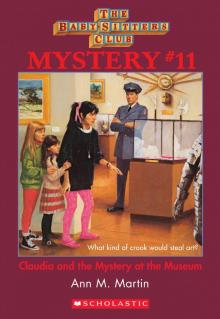 Claudia and the Mystery at the Museum
Claudia and the Mystery at the Museum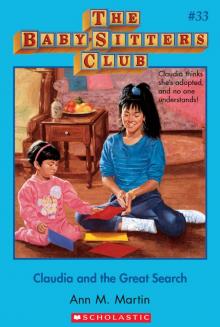 Claudia and the Great Search
Claudia and the Great Search Karen's Doll
Karen's Doll Shannon's Story
Shannon's Story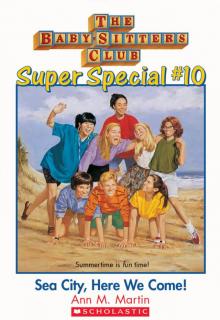 Sea City, Here We Come!
Sea City, Here We Come!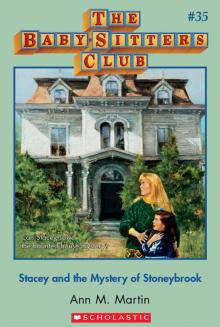 Stacey and the Mystery of Stoneybrook
Stacey and the Mystery of Stoneybrook Karen's Treasure
Karen's Treasure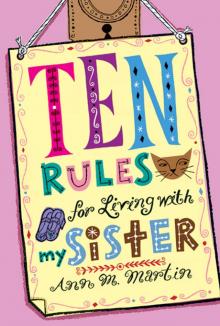 Ten Rules for Living With My Sister
Ten Rules for Living With My Sister With You and Without You
With You and Without You Baby-Sitters' Island Adventure
Baby-Sitters' Island Adventure Karen's Fishing Trip
Karen's Fishing Trip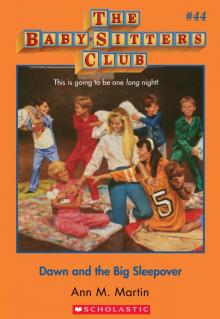 Dawn and the Big Sleepover
Dawn and the Big Sleepover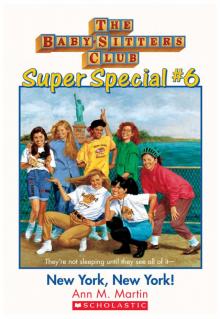 New York, New York!
New York, New York! Ten Kids, No Pets
Ten Kids, No Pets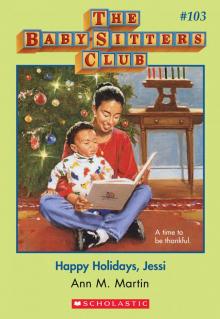 Happy Holidays, Jessi
Happy Holidays, Jessi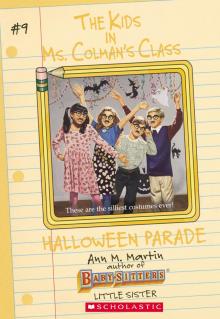 Halloween Parade
Halloween Parade Karen's New Holiday
Karen's New Holiday Kristy Power!
Kristy Power! Karen's Wish
Karen's Wish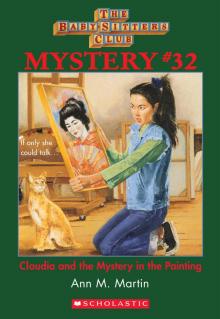 Claudia and the Mystery in the Painting
Claudia and the Mystery in the Painting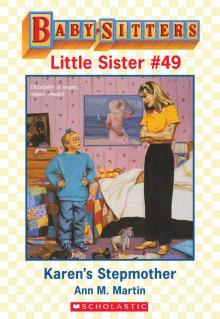 Karen's Stepmother
Karen's Stepmother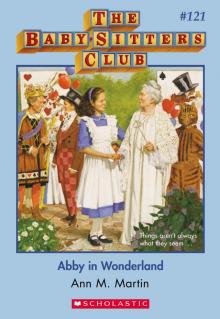 Abby in Wonderland
Abby in Wonderland Karen's Snow Day
Karen's Snow Day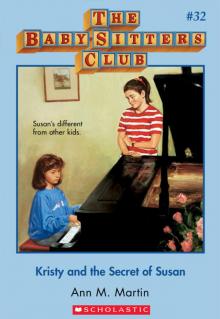 Kristy and the Secret of Susan
Kristy and the Secret of Susan Karen's Pony Camp
Karen's Pony Camp Karen's School Trip
Karen's School Trip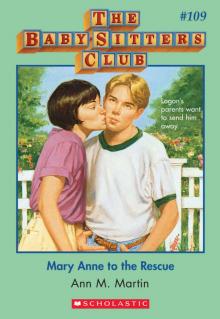 Mary Anne to the Rescue
Mary Anne to the Rescue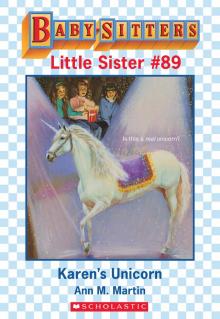 Karen's Unicorn
Karen's Unicorn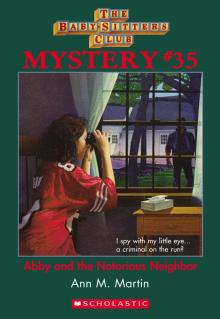 Abby and the Notorious Neighbor
Abby and the Notorious Neighbor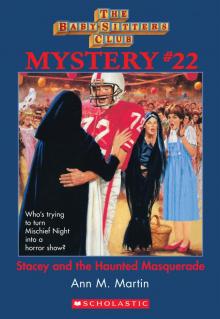 Stacey and the Haunted Masquerade
Stacey and the Haunted Masquerade Claudia Gets Her Guy
Claudia Gets Her Guy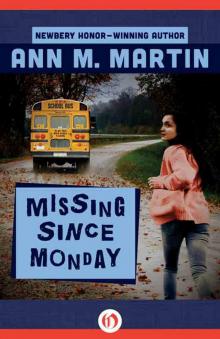 Missing Since Monday
Missing Since Monday Stacey's Choice
Stacey's Choice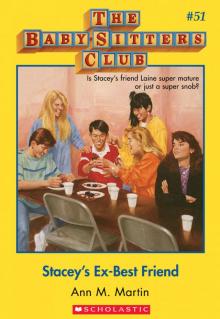 Stacey's Ex-Best Friend
Stacey's Ex-Best Friend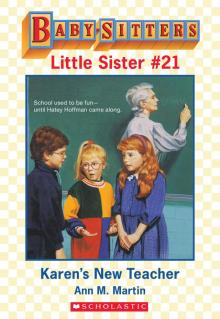 Karen's New Teacher
Karen's New Teacher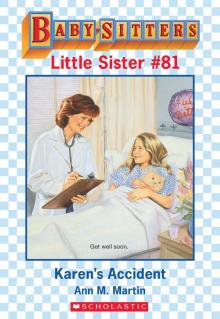 Karen's Accident
Karen's Accident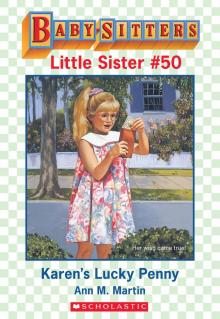 Karen's Lucky Penny
Karen's Lucky Penny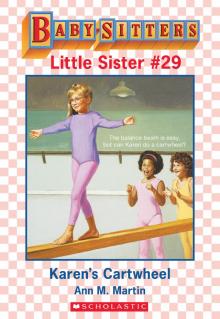 Karen's Cartwheel
Karen's Cartwheel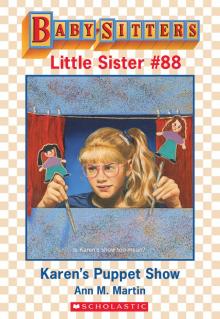 Karen's Puppet Show
Karen's Puppet Show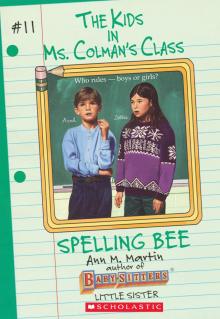 Spelling Bee
Spelling Bee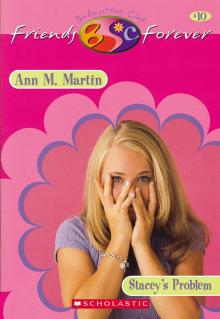 Stacey's Problem
Stacey's Problem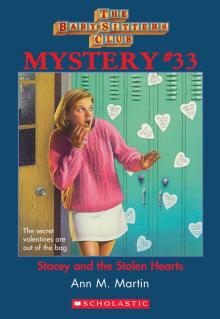 Stacey and the Stolen Hearts
Stacey and the Stolen Hearts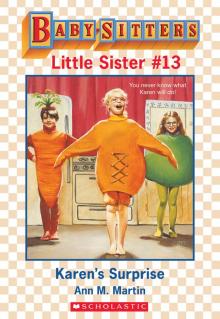 Karen's Surprise
Karen's Surprise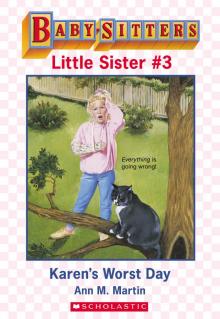 Karen's Worst Day
Karen's Worst Day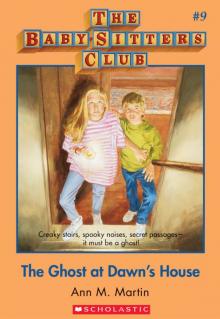 The Ghost at Dawn's House
The Ghost at Dawn's House Karen's Big Sister
Karen's Big Sister Karen's Easter Parade
Karen's Easter Parade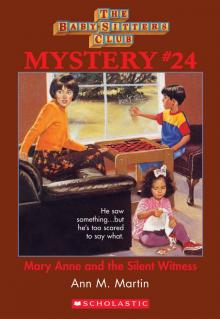 Mary Anne and the Silent Witness
Mary Anne and the Silent Witness Karen's Swim Meet
Karen's Swim Meet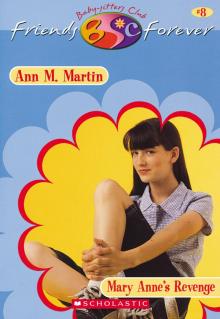 Mary Anne's Revenge
Mary Anne's Revenge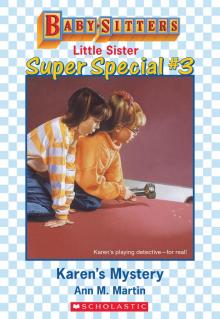 Karen's Mystery
Karen's Mystery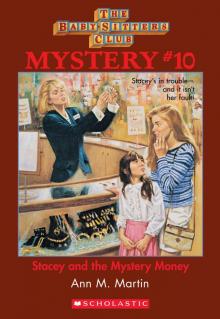 Stacey and the Mystery Money
Stacey and the Mystery Money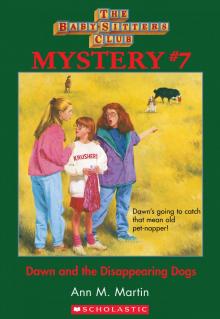 Dawn and the Disappearing Dogs
Dawn and the Disappearing Dogs Karen's Christmas Tree
Karen's Christmas Tree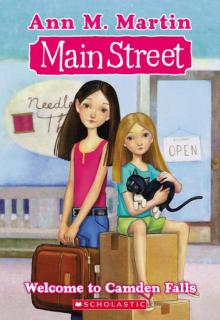 Welcome to Camden Falls
Welcome to Camden Falls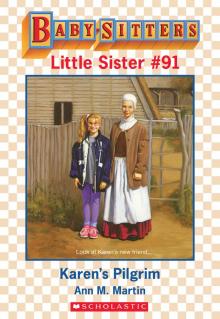 Karen's Pilgrim
Karen's Pilgrim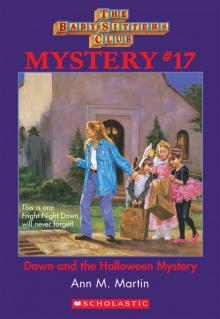 Dawn and the Halloween Mystery
Dawn and the Halloween Mystery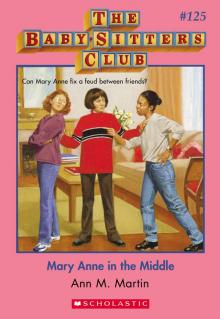 Mary Anne in the Middle
Mary Anne in the Middle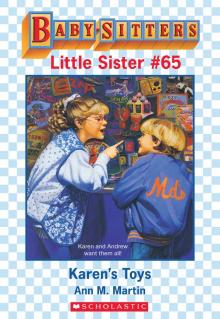 Karen's Toys
Karen's Toys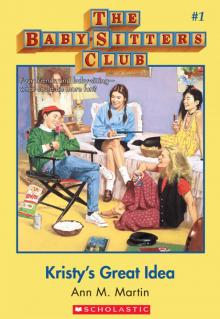 Kristy's Great Idea
Kristy's Great Idea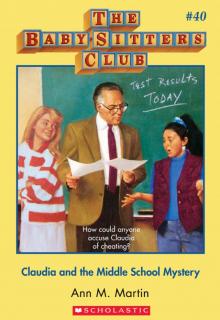 Claudia and the Middle School Mystery
Claudia and the Middle School Mystery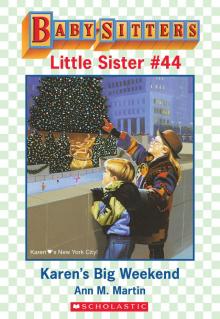 Karen's Big Weekend
Karen's Big Weekend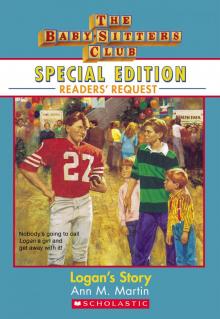 Logan's Story
Logan's Story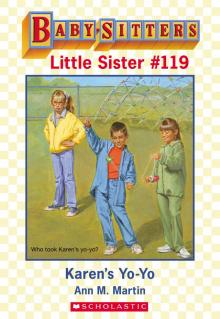 Karen's Yo-Yo
Karen's Yo-Yo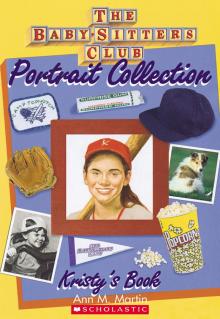 Kristy's Book
Kristy's Book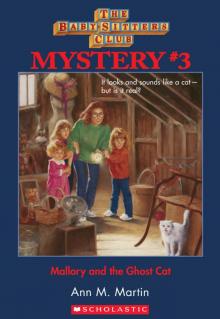 Mallory and the Ghost Cat
Mallory and the Ghost Cat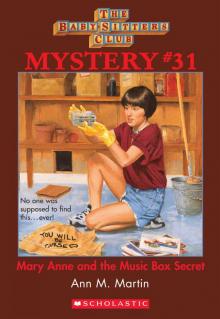 Mary Anne and the Music
Mary Anne and the Music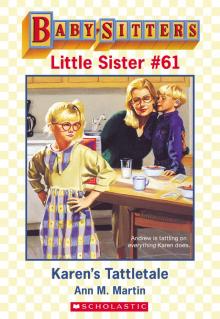 Karen's Tattletale
Karen's Tattletale Karen's County Fair
Karen's County Fair Karen's Mermaid
Karen's Mermaid Snowbound
Snowbound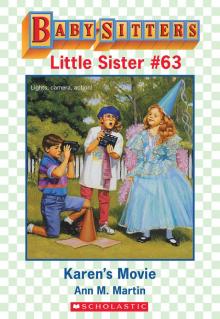 Karen's Movie
Karen's Movie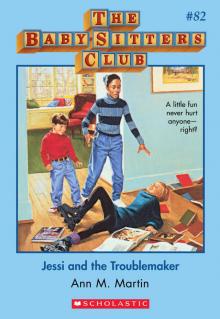 Jessi and the Troublemaker
Jessi and the Troublemaker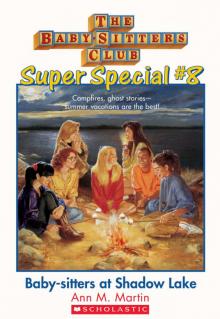 Baby-Sitters at Shadow Lake
Baby-Sitters at Shadow Lake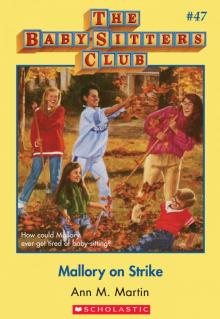 Mallory on Strike
Mallory on Strike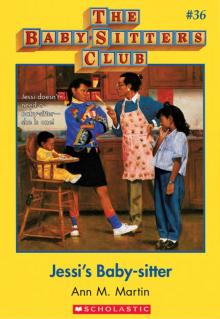 Jessi's Baby-Sitter
Jessi's Baby-Sitter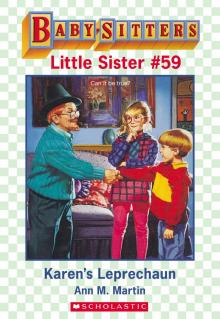 Karen's Leprechaun
Karen's Leprechaun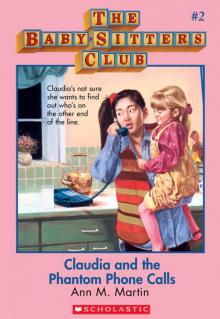 Claudia and the Phantom Phone Calls
Claudia and the Phantom Phone Calls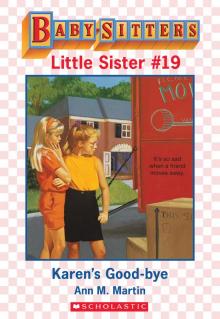 Karen's Good-Bye
Karen's Good-Bye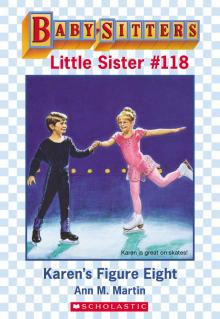 Karen's Figure Eight
Karen's Figure Eight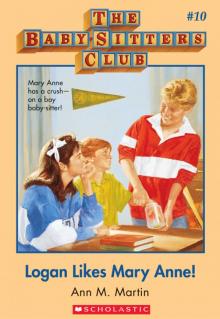 Logan Likes Mary Anne!
Logan Likes Mary Anne!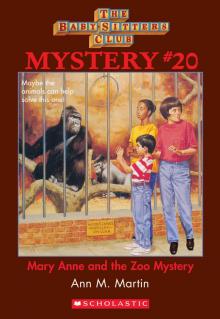 Mary Anne and the Zoo Mystery
Mary Anne and the Zoo Mystery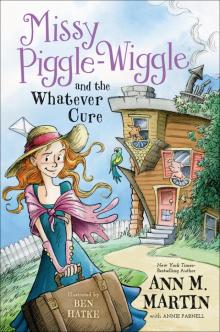 Missy Piggle-Wiggle and the Whatever Cure
Missy Piggle-Wiggle and the Whatever Cure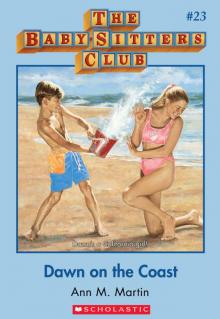 Dawn on the Coast
Dawn on the Coast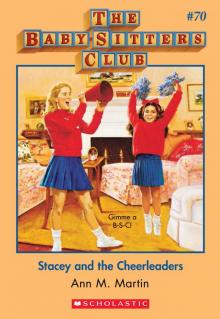 Stacey and the Cheerleaders
Stacey and the Cheerleaders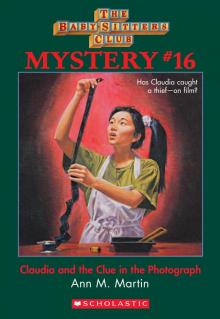 Claudia and the Clue in the Photograph
Claudia and the Clue in the Photograph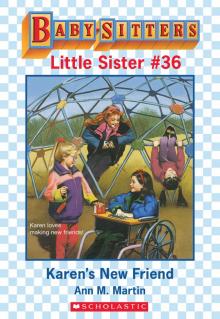 Karen's New Friend
Karen's New Friend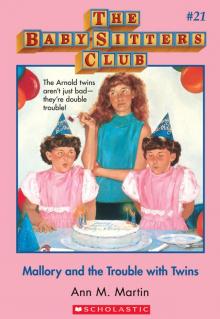 Mallory and the Trouble With Twins
Mallory and the Trouble With Twins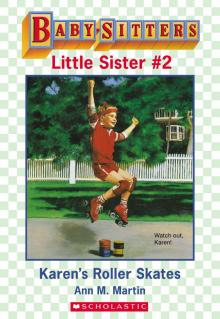 Karen's Roller Skates
Karen's Roller Skates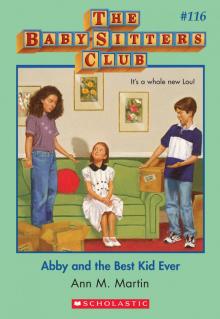 Abby and the Best Kid Ever
Abby and the Best Kid Ever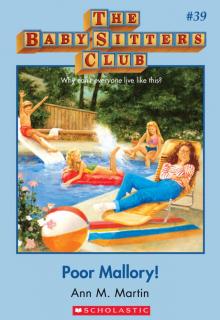 Poor Mallory!
Poor Mallory!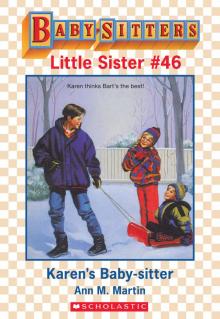 Karen's Witch
Karen's Witch Karen's Grandmothers
Karen's Grandmothers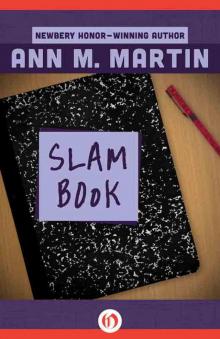 Slam Book
Slam Book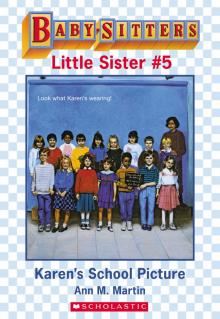 Karen's School Picture
Karen's School Picture Karen's Reindeer
Karen's Reindeer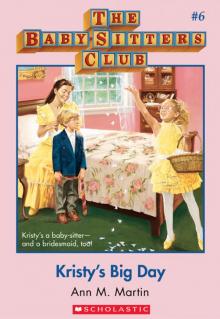 Kristy's Big Day
Kristy's Big Day The Long Way Home
The Long Way Home Karen's Sleigh Ride
Karen's Sleigh Ride On Christmas Eve
On Christmas Eve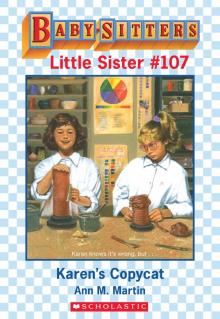 Karen's Copycat
Karen's Copycat Karen's Ice Skates
Karen's Ice Skates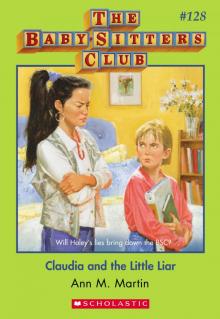 Claudia and the Little Liar
Claudia and the Little Liar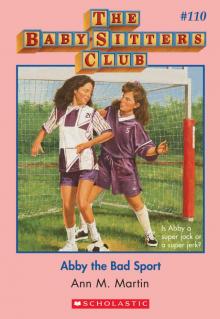 Abby the Bad Sport
Abby the Bad Sport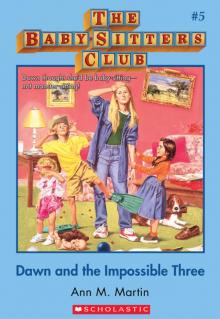 The Baby-Sitters Club #5: Dawn and the Impossible Three
The Baby-Sitters Club #5: Dawn and the Impossible Three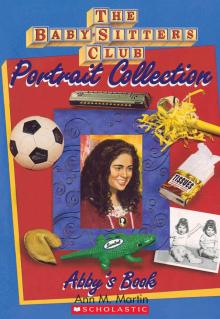 Abby's Book
Abby's Book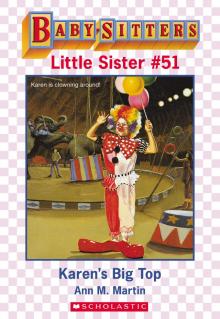 Karen's Big Top
Karen's Big Top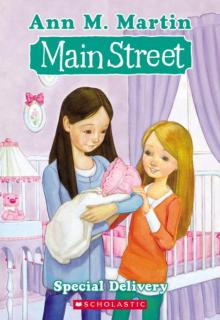 Main Street #8: Special Delivery
Main Street #8: Special Delivery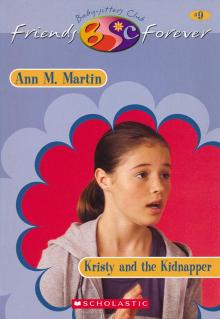 Kristy and the Kidnapper
Kristy and the Kidnapper Karen's Ski Trip
Karen's Ski Trip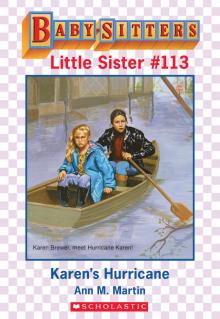 Karen's Hurricane
Karen's Hurricane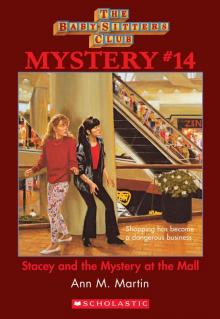 Stacey and the Mystery at the Mall
Stacey and the Mystery at the Mall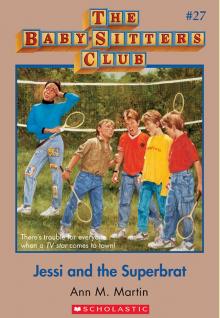 Jessi and the Superbrat
Jessi and the Superbrat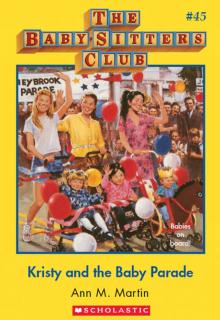 Kristy and the Baby Parade
Kristy and the Baby Parade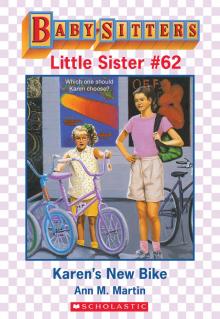 Karen's New Bike
Karen's New Bike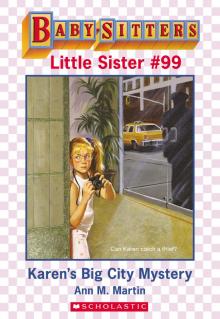 Karen's Big City Mystery
Karen's Big City Mystery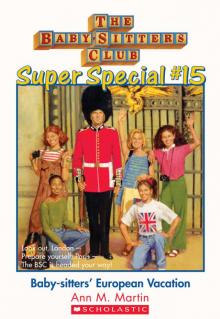 Baby-Sitters' European Vacation
Baby-Sitters' European Vacation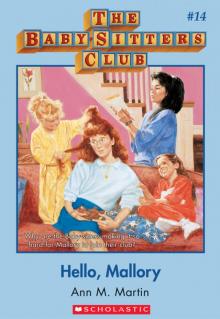 Hello, Mallory
Hello, Mallory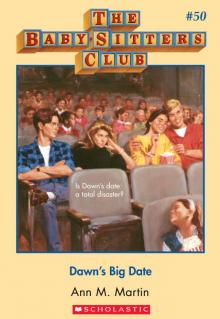 Dawn's Big Date
Dawn's Big Date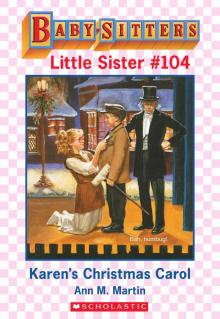 Karen's Christmas Carol
Karen's Christmas Carol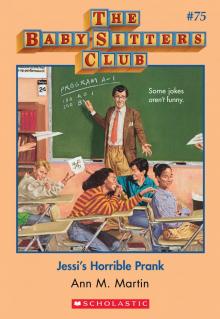 Jessi's Horrible Prank
Jessi's Horrible Prank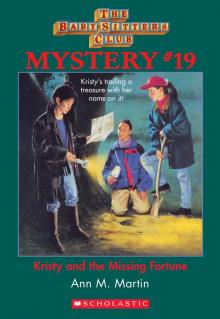 Kristy and the Missing Fortune
Kristy and the Missing Fortune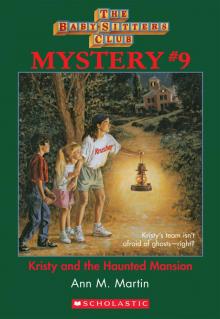 Kristy and the Haunted Mansion
Kristy and the Haunted Mansion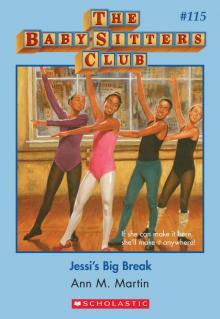 Jessi's Big Break
Jessi's Big Break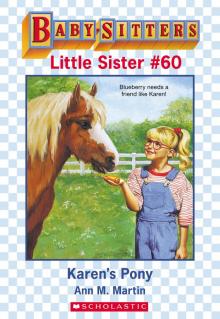 Karen's Pony
Karen's Pony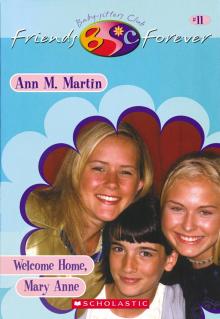 Welcome Home, Mary Anne
Welcome Home, Mary Anne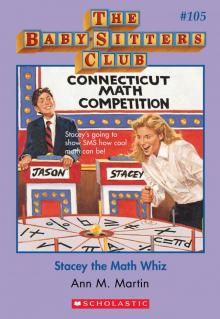 Stacey the Math Whiz
Stacey the Math Whiz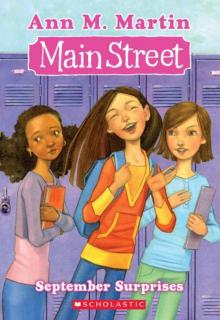 September Surprises
September Surprises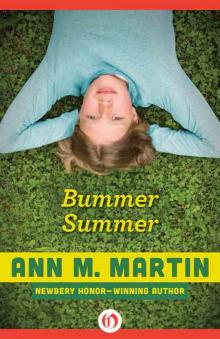 Bummer Summer
Bummer Summer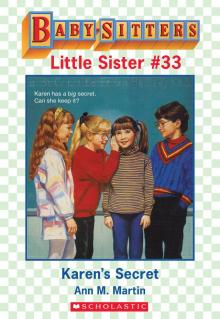 Karen's Secret
Karen's Secret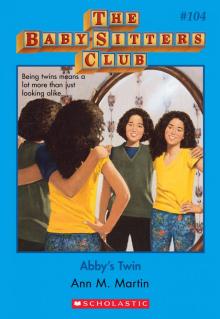 Abby's Twin
Abby's Twin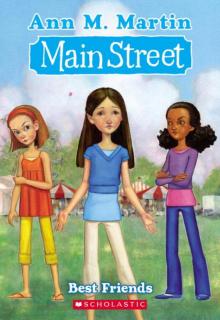 Main Street #4: Best Friends
Main Street #4: Best Friends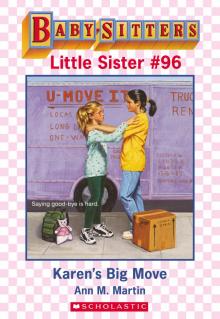 Karen's Big Move
Karen's Big Move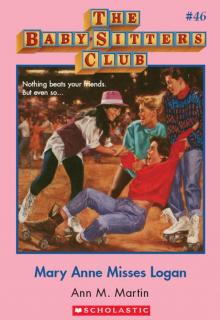 Mary Anne Misses Logan
Mary Anne Misses Logan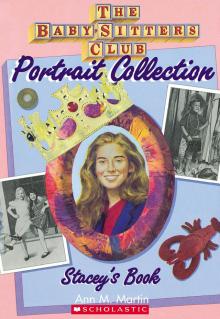 Stacey's Book
Stacey's Book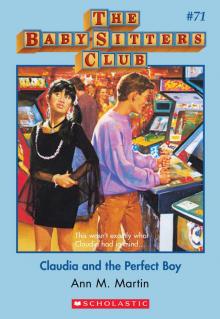 Claudia and the Perfect Boy
Claudia and the Perfect Boy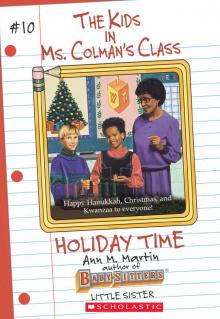 Holiday Time
Holiday Time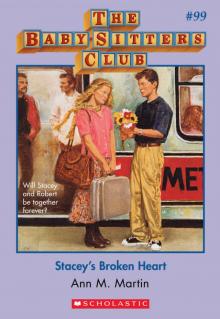 Stacey's Broken Heart
Stacey's Broken Heart Karen's Field Day
Karen's Field Day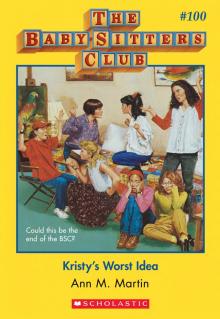 Kristy's Worst Idea
Kristy's Worst Idea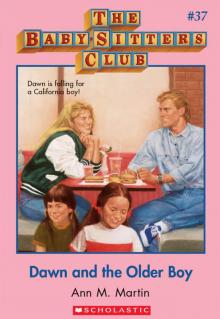 Dawn and the Older Boy
Dawn and the Older Boy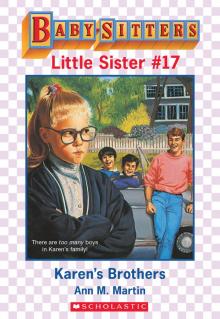 Karen's Brothers
Karen's Brothers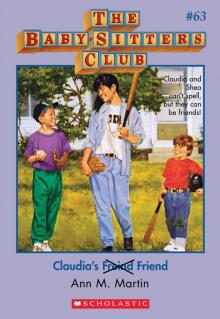 Claudia's Friend
Claudia's Friend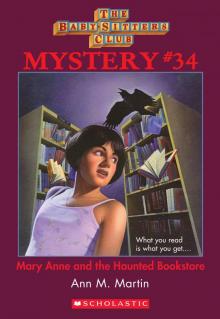 Mary Anne and the Haunted Bookstore
Mary Anne and the Haunted Bookstore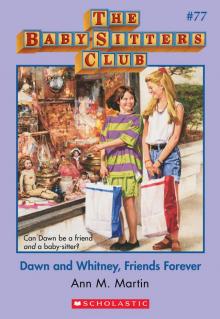 Dawn and Whitney, Friends Forever
Dawn and Whitney, Friends Forever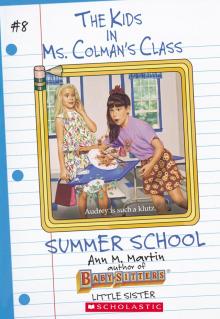 Summer School
Summer School Karen's Birthday
Karen's Birthday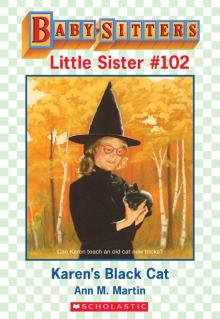 Karen's Black Cat
Karen's Black Cat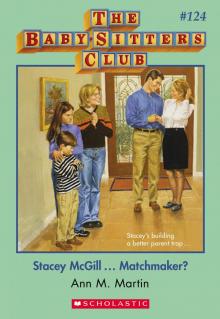 Stacey McGill... Matchmaker?
Stacey McGill... Matchmaker?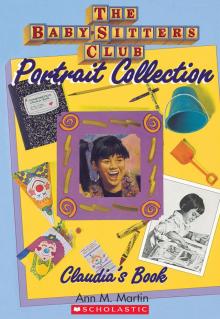 Claudia's Book
Claudia's Book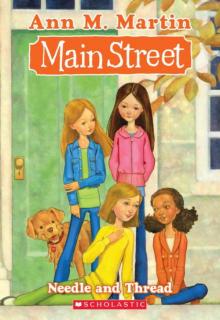 Main Street #2: Needle and Thread
Main Street #2: Needle and Thread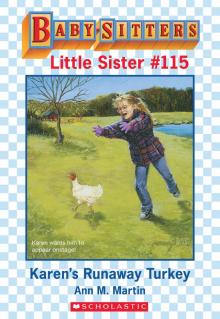 Karen's Runaway Turkey
Karen's Runaway Turkey Karen's Campout
Karen's Campout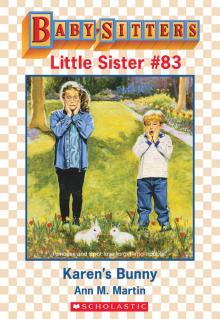 Karen's Bunny
Karen's Bunny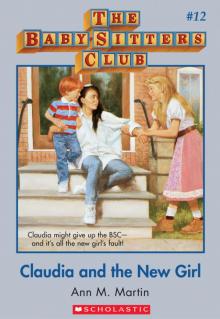 Claudia and the New Girl
Claudia and the New Girl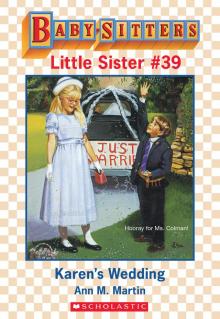 Karen's Wedding
Karen's Wedding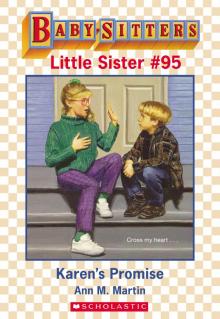 Karen's Promise
Karen's Promise Karen's Snow Princess
Karen's Snow Princess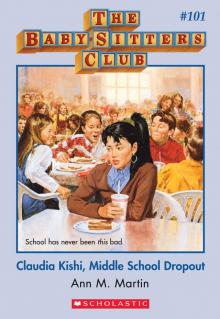 Claudia Kishi, Middle School Dropout
Claudia Kishi, Middle School Dropout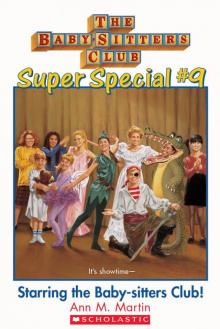 Starring the Baby-Sitters Club!
Starring the Baby-Sitters Club!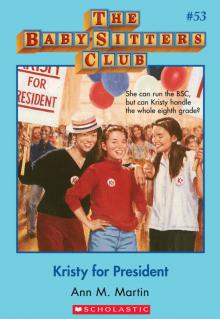 Kristy for President
Kristy for President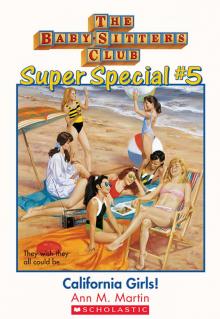 California Girls!
California Girls!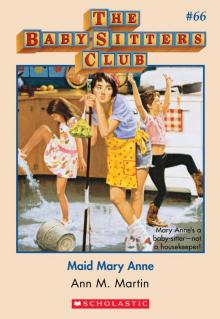 Maid Mary Anne
Maid Mary Anne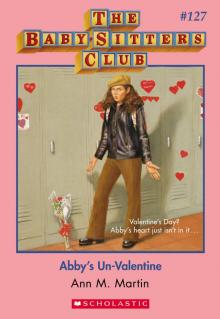 Abby's Un-Valentine
Abby's Un-Valentine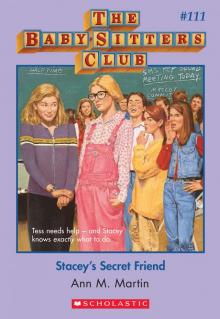 Stacey's Secret Friend
Stacey's Secret Friend Karen's Haunted House
Karen's Haunted House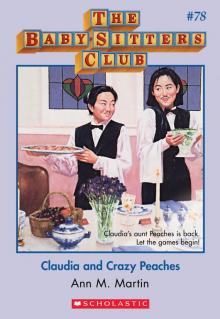 Claudia and Crazy Peaches
Claudia and Crazy Peaches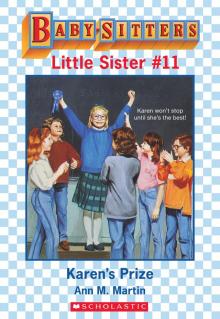 Karen's Prize
Karen's Prize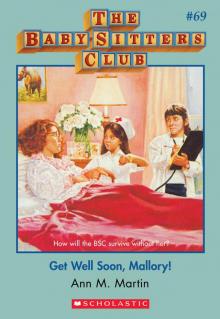 Get Well Soon, Mallory!
Get Well Soon, Mallory!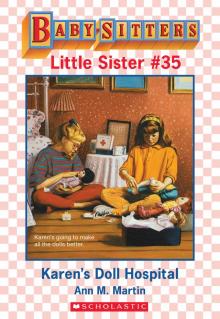 Karen's Doll Hospital
Karen's Doll Hospital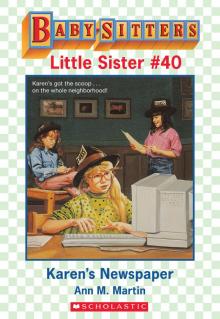 Karen's Newspaper
Karen's Newspaper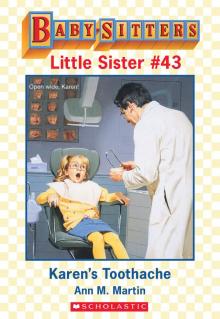 Karen's Toothache
Karen's Toothache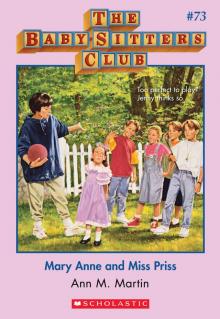 Mary Anne and Miss Priss
Mary Anne and Miss Priss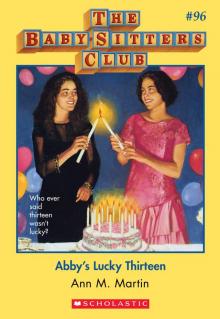 Abby's Lucky Thirteen
Abby's Lucky Thirteen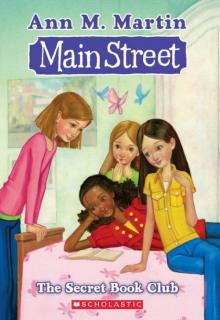 The Secret Book Club
The Secret Book Club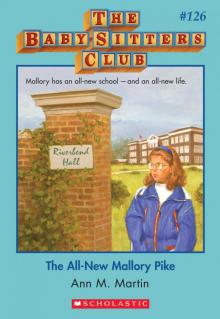 The All-New Mallory Pike
The All-New Mallory Pike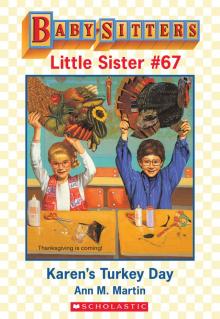 Karen's Turkey Day
Karen's Turkey Day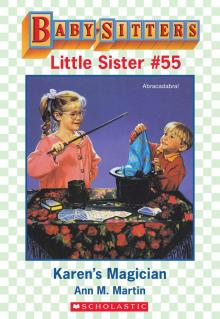 Karen's Magician
Karen's Magician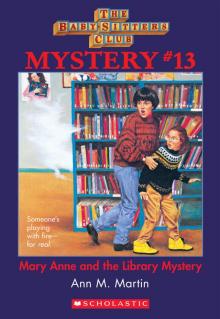 Mary Anne and the Library Mystery
Mary Anne and the Library Mystery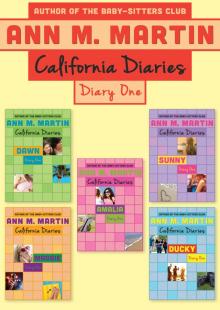 Diary One: Dawn, Sunny, Maggie, Amalia, and Ducky
Diary One: Dawn, Sunny, Maggie, Amalia, and Ducky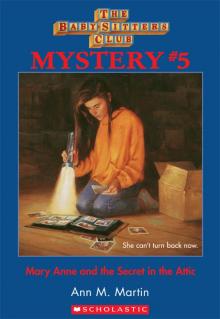 Mary Anne and the Secret in the Attic
Mary Anne and the Secret in the Attic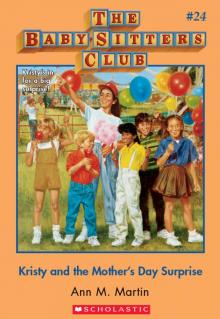 Kristy and the Mother's Day Surprise
Kristy and the Mother's Day Surprise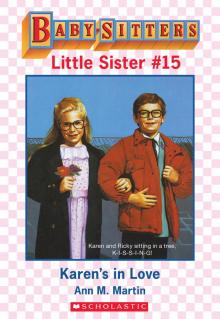 Karen's in Love
Karen's in Love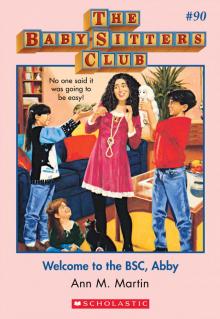 Welcome to the BSC, Abby
Welcome to the BSC, Abby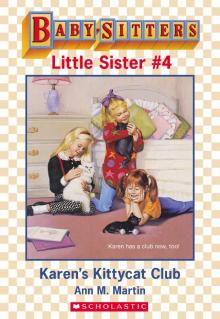 Karen's Kittycat Club
Karen's Kittycat Club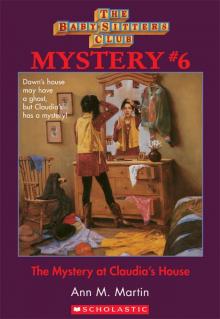 The Mystery at Claudia's House
The Mystery at Claudia's House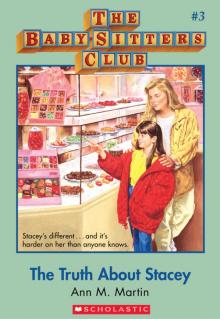 The Truth About Stacey
The Truth About Stacey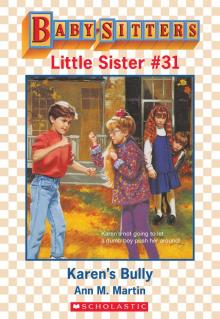 Karen's Bully
Karen's Bully Karen's Gift
Karen's Gift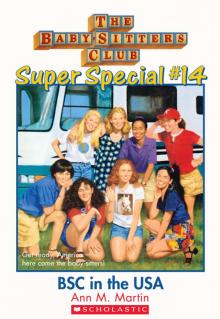 BSC in the USA
BSC in the USA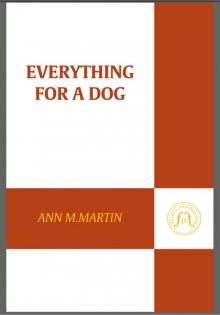 Everything for a Dog
Everything for a Dog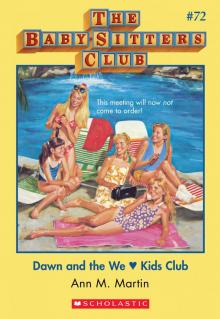 Dawn and the We Love Kids Club
Dawn and the We Love Kids Club Karen's Ghost
Karen's Ghost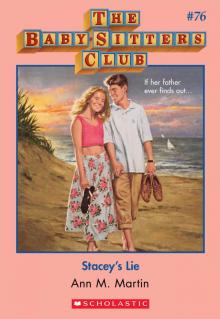 Stacey's Lie
Stacey's Lie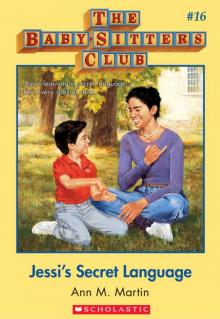 Jessi's Secret Language
Jessi's Secret Language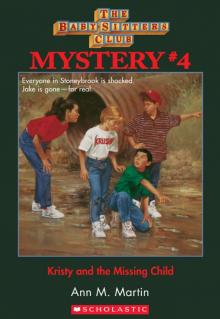 Kristy and the Missing Child
Kristy and the Missing Child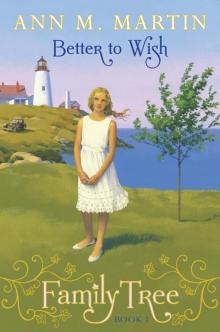 Better to Wish
Better to Wish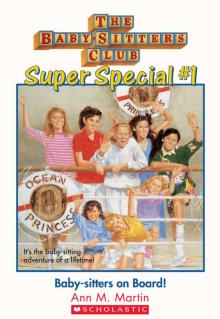 Baby-Sitters on Board!
Baby-Sitters on Board!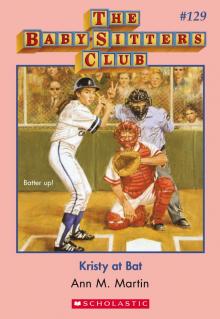 Kristy at Bat
Kristy at Bat Everything Changes
Everything Changes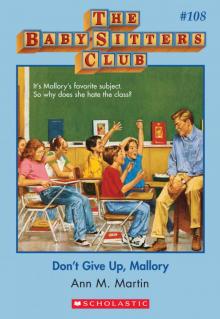 Don't Give Up, Mallory
Don't Give Up, Mallory A Dog's Life: The Autobiography of a Stray
A Dog's Life: The Autobiography of a Stray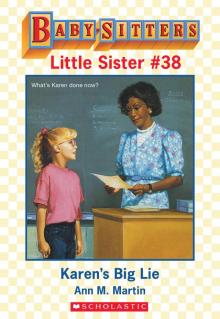 Karen's Big Lie
Karen's Big Lie Karen's Show and Share
Karen's Show and Share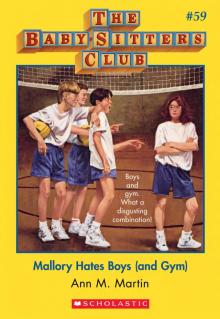 Mallory Hates Boys (and Gym)
Mallory Hates Boys (and Gym)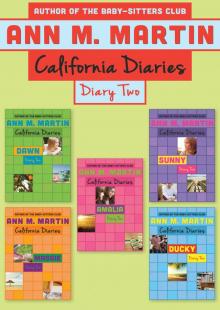 Diary Two: Dawn, Sunny, Maggie, Amalia, and Ducky
Diary Two: Dawn, Sunny, Maggie, Amalia, and Ducky Karen's Pen Pal
Karen's Pen Pal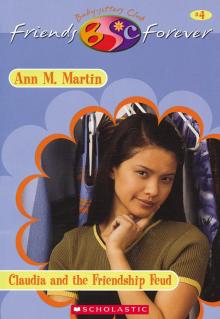 Claudia and the Friendship Feud
Claudia and the Friendship Feud Karen's Secret Valentine
Karen's Secret Valentine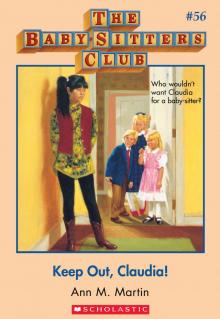 Keep Out, Claudia!
Keep Out, Claudia! Aloha, Baby-Sitters!
Aloha, Baby-Sitters!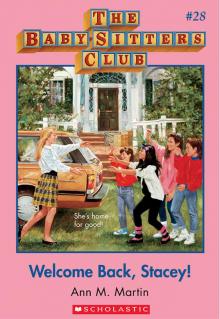 Welcome Back, Stacey
Welcome Back, Stacey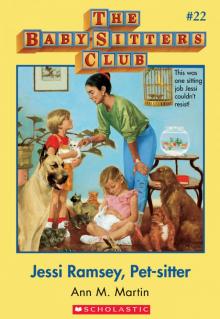 Jessi Ramsey, Pet-Sitter
Jessi Ramsey, Pet-Sitter Karen's Pizza Party
Karen's Pizza Party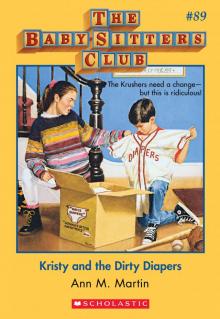 Kristy and the Dirty Diapers
Kristy and the Dirty Diapers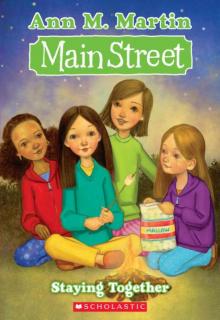 Staying Together
Staying Together Dawn and the Surfer Ghost
Dawn and the Surfer Ghost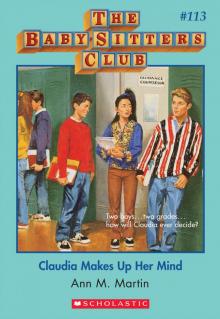 Claudia Makes Up Her Mind
Claudia Makes Up Her Mind Jessi's Gold Medal
Jessi's Gold Medal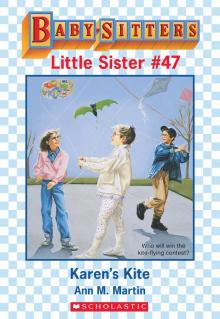 Karen's Kite
Karen's Kite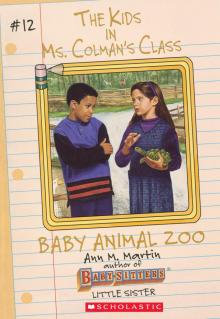 Baby Animal Zoo
Baby Animal Zoo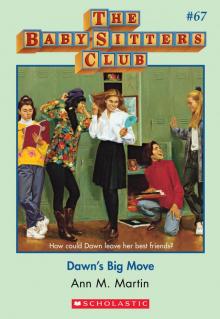 Dawn's Big Move
Dawn's Big Move Karen's Big Joke
Karen's Big Joke Karen's Lemonade Stand
Karen's Lemonade Stand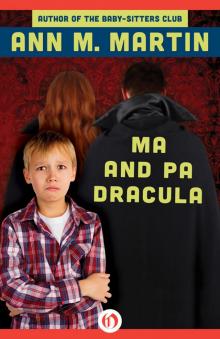 Ma and Pa Dracula
Ma and Pa Dracula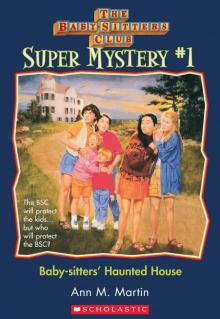 Baby-Sitters' Haunted House
Baby-Sitters' Haunted House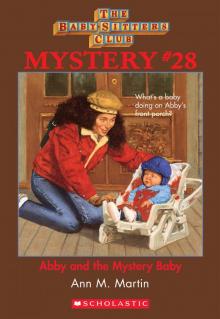 Abby and the Mystery Baby
Abby and the Mystery Baby Home Is the Place
Home Is the Place Karen's Grandad
Karen's Grandad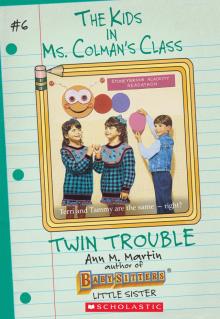 Twin Trouble
Twin Trouble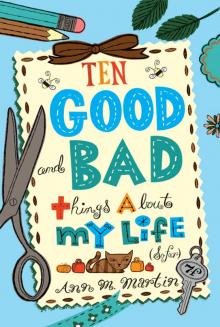 Ten Good and Bad Things About My Life (So Far)
Ten Good and Bad Things About My Life (So Far)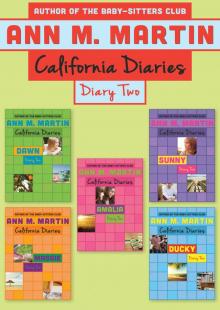 Diary Two
Diary Two Baby-Sitters Club 027
Baby-Sitters Club 027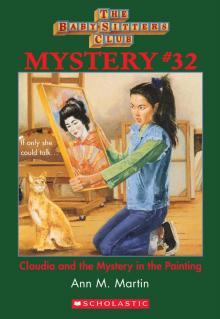 Claudia and the Mystery Painting
Claudia and the Mystery Painting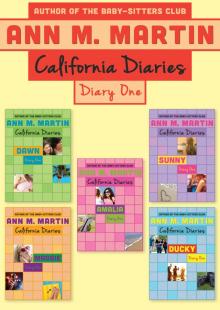 Diary One
Diary One Baby-Sitters Club 037
Baby-Sitters Club 037 Baby-Sitters Club 028
Baby-Sitters Club 028 Baby-Sitters Club 085
Baby-Sitters Club 085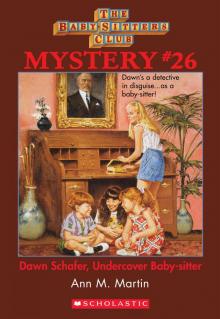 Dawn Schaffer Undercover Baby-Sitter
Dawn Schaffer Undercover Baby-Sitter Jessi's Babysitter
Jessi's Babysitter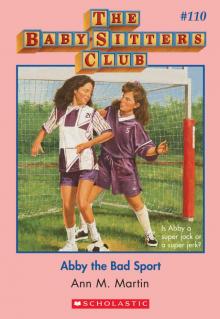 The Baby-Sitters Club #110: Abby the Bad Sport (Baby-Sitters Club, The)
The Baby-Sitters Club #110: Abby the Bad Sport (Baby-Sitters Club, The) Karen's Little Sister
Karen's Little Sister Baby-Sitters Club 058
Baby-Sitters Club 058 Claudia And The Genius On Elm St.
Claudia And The Genius On Elm St.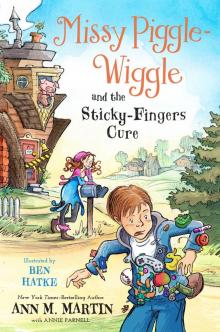 Missy Piggle-Wiggle and the Sticky-Fingers Cure
Missy Piggle-Wiggle and the Sticky-Fingers Cure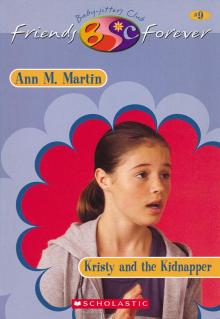 Kristy and Kidnapper
Kristy and Kidnapper Baby-Sitters Club 041
Baby-Sitters Club 041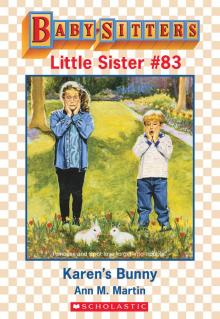 Karen's Bunny Trouble
Karen's Bunny Trouble Baby-Sitters Club 032
Baby-Sitters Club 032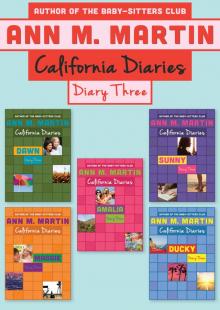 Diary Three
Diary Three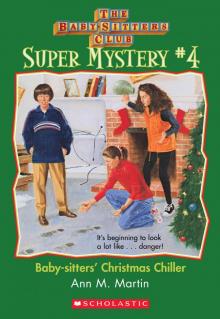 Christmas Chiller
Christmas Chiller Karen's Half-Birthday
Karen's Half-Birthday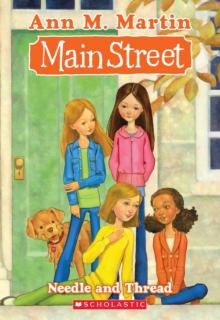 Needle and Thread
Needle and Thread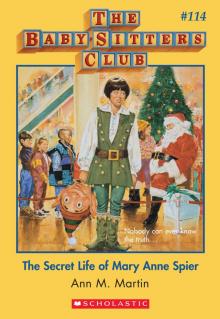 Secret Life of Mary Anne Spier
Secret Life of Mary Anne Spier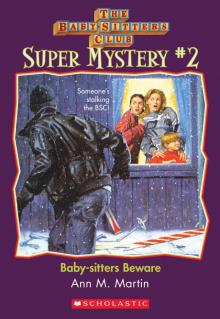 Baby-Sitters Beware
Baby-Sitters Beware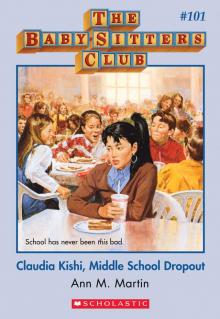 Claudia Kishi, Middle School Drop-Out
Claudia Kishi, Middle School Drop-Out Logan Likes Mary Anne !
Logan Likes Mary Anne ! Baby-Sitters Club 061
Baby-Sitters Club 061 Best Friends
Best Friends Baby-Sitters Club 031
Baby-Sitters Club 031 Karen's Little Witch
Karen's Little Witch Jessi Ramsey, Petsitter
Jessi Ramsey, Petsitter Baby-Sitters Club 123
Baby-Sitters Club 123 Baby-Sitters Club 059
Baby-Sitters Club 059 Baby-Sitters Club 033
Baby-Sitters Club 033 Baby-Sitters Club 060
Baby-Sitters Club 060 Baby-Sitters Club 094
Baby-Sitters Club 094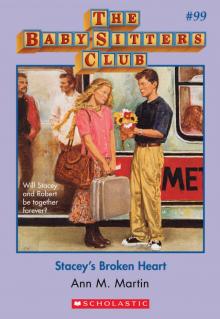 The Baby-Sitters Club #99: Stacey's Broken Heart
The Baby-Sitters Club #99: Stacey's Broken Heart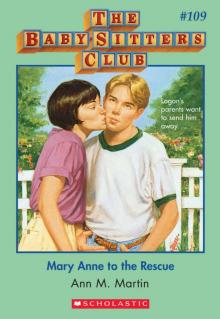 The Baby-Sitters Club #109: Mary Anne to the Rescue (Baby-Sitters Club, The)
The Baby-Sitters Club #109: Mary Anne to the Rescue (Baby-Sitters Club, The) Mystery At Claudia's House
Mystery At Claudia's House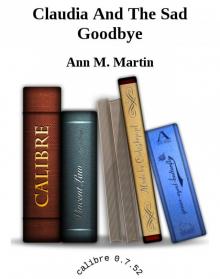 Claudia And The Sad Goodbye
Claudia And The Sad Goodbye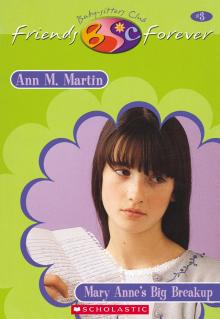 Mary Anne's Big Break-Up
Mary Anne's Big Break-Up Baby-Sitters Club 025
Baby-Sitters Club 025 Baby-Sitters Club 042
Baby-Sitters Club 042 Stacey and the Mystery of the Empty House
Stacey and the Mystery of the Empty House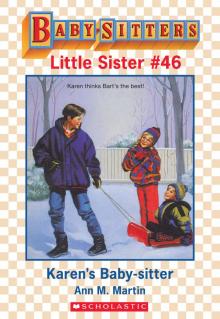 Karen's Baby-Sitter
Karen's Baby-Sitter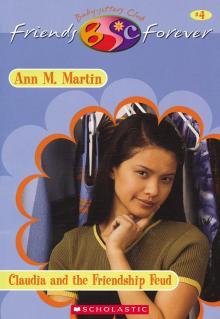 Claudia's Friendship Feud
Claudia's Friendship Feud Baby-Sitters Club 090
Baby-Sitters Club 090 Baby-Sitters Club 021
Baby-Sitters Club 021 Baby-Sitters Club 056
Baby-Sitters Club 056 Baby-Sitters Club 040
Baby-Sitters Club 040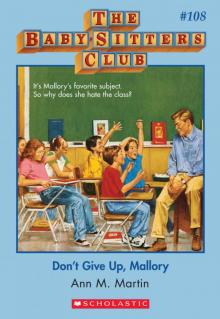 The Baby-Sitters Club #108: Don't Give Up, Mallory (Baby-Sitters Club, The)
The Baby-Sitters Club #108: Don't Give Up, Mallory (Baby-Sitters Club, The)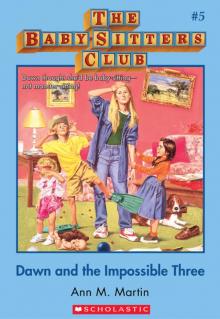 Dawn and the Impossible Three
Dawn and the Impossible Three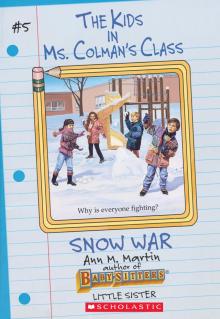 The Snow War
The Snow War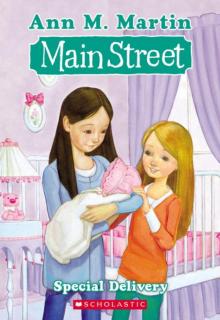 Special Delivery
Special Delivery Baby-Sitters Club 057
Baby-Sitters Club 057 Mary Anne And Too Many Babies
Mary Anne And Too Many Babies Baby-Sitters Club 030
Baby-Sitters Club 030